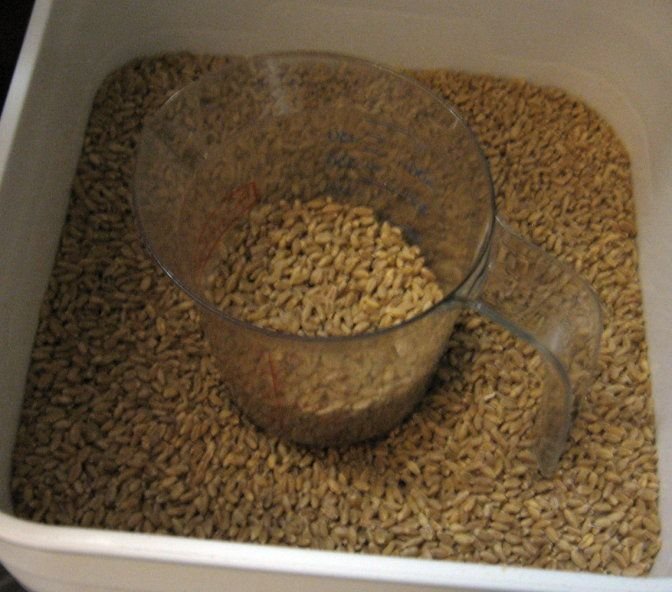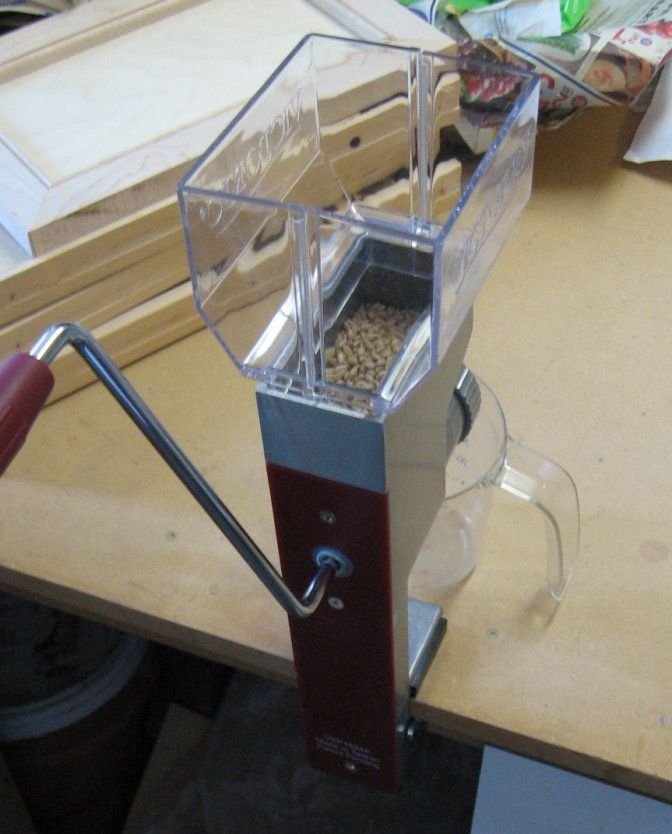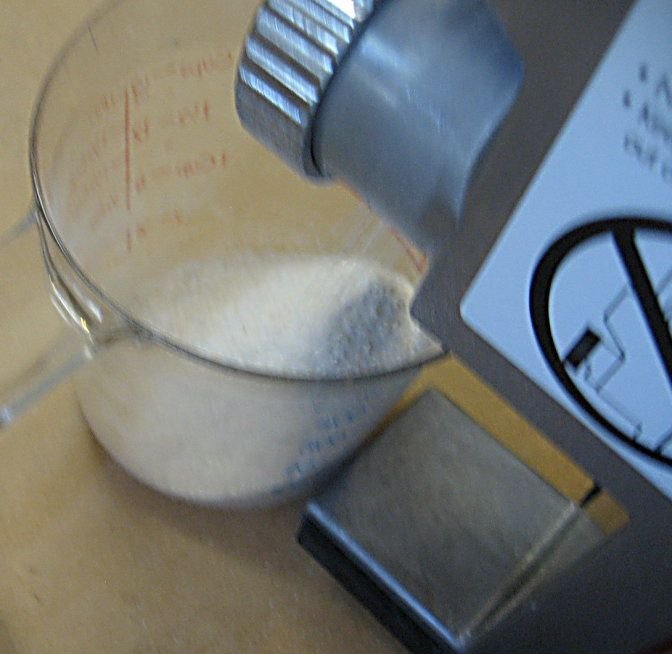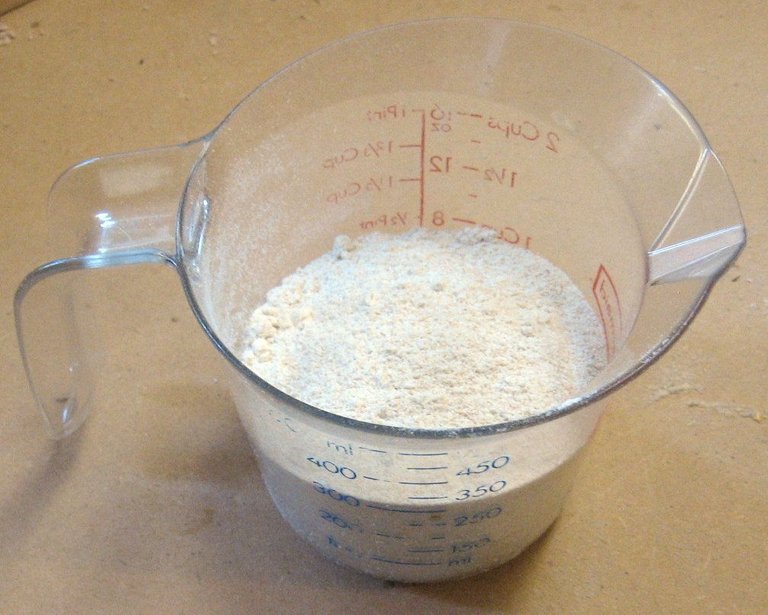In my last post I talked about how whole wheat flour wasn't.
That the thing called whole wheat flour, in the stores, is actually white flour with a bit of the germ and bran put back in. Or basically, colored white flour.
Freshly ground wheat flour is nothing like the store bought flour.
The flavors, texture, and nutrients are on a completely different level.

Wheat Berries
There is no real comparison between a cup of coffee made with freshly ground coffee beans and one made with ground coffee from a can. Fresh ground wheat makes that coffee comparison seem trivial. You may actually try to stop calling that stuff in the store flour. Because it isn't.
The wheat seed is a perfect vessel for storing nutrients. In the field, through the freezing winter storms, it will survive, intact, for years. In a cool, dry storage place it will last for decades. Savings its energy for when it will grow into a new wheat stalk, or when it will give of its bounty to maintain another life.

Hand Powered Wheat Grinder
So, to make the flour shelf stable, so that it can sit on the store shelf for years, all of the nutrients are removed. Along with all of the oils. Further, it may be bleached (they pour Clorox® on it). It is a very sad state. 🙁
Grinding your flour just before you bake is an excellent way to get all of those important nutrients and oils into your loaves and muffins. Along with getting the most flavorful bread.
With store bought whole wheat flour there is a slight bitter tang to its taste. This appears to be because the germ, that was put back in, is slowly going rancid. With fresh ground flour, there is no bitter tang. It tastes wonderful and fresh, right in the cup.
Further, fresh ground flour is better for gluten intolerant people. It all the parts of the wheat berry including the oils, which balance out the partial protein that the gluten is.

Grinding Flour

A Measuring Cup of Freshly Ground Flour
More information showing bread made with fresh ground vs store bought wheat:
http://blog.kingarthurflour.com/2010/10/15/grind-your-own-whole-wheat-flour-%E2%80%93-how-sweet-is-that/

OMG, so grateful for the post. I will see if I can do this too.
Its easy to do. Well... its a work out to do, because I have a hand cranked grinder. But, it is well worth it.
Let me know if I should do an article on grinders.
I would be interested in grinders, also GMO's I do wont to buy them or grind them if I can help it.
Yes please! 😊
My Dad used to make bread out of fresh ground flour and I would have two pieces of toast for breakfast and be completely full and I was a very good eater.
Freshly ground flour is really a whole different animal.
Great post, Thanks for sharing it.
And thank you for visiting and reading.
Love this post! I've been baking my own bread for years but have never ground my own flour. I do, however, brew beer from fresh malted grain and if the flavours of freshly ground flour is in any way analogous to that, I'd be in for a treat!
If you already use whole wheat flour in your bread making, then you will find this to be a nice step up.
If you use white flour in your bread making, learning to work with entire grain flour takes a bit of learning.
But it is the difference between Panera bread and Wonder bread. (You wonder why they call it bread)
I've used plenty of different types of flour, love the range in flavours, but I've never come close to Wonder bread. I have my share of guilty pleasures but that can't ever be one of them.
One thing more, slowly rising bread with less yeast gives much more flavor. One more way of controlling the speed and increasing the flavor is to rise the dough in cooler temperatures, where it is slower but developes a stronger flavor.
Nothing to do with fresh flour though, just wanted to comment on baking :)
I did enjoy the post and I might try making my fresh flour too!
This is very true... well, for the most part.
The flavor is not as strong as a sourdough, nor as strong as adding pumpernickel or rye.
I would say the flavor is more wheat-y and less yeast-y.
I definitely like it better if I have the time. (and the house isn't 90 degrees)
Ha, I know :D Sourdough gives it's very special aroma, as goes adding rye. I googled what pumpernickel is and it looks like something really special.
Slow rising with less yeast and colder temperatures cause the bread become a bit more sour from the types of acids created in the dough, but not as much as with sourdough, which is always far more sour.
If I'm making bread from wheat and not adding that much rye, I'm using malts to give some special flavor in the bread. :) I should make a post about making a traditional Finnish rye bread using sourdough, if you might have a taste for that.
All baking posts seem to be popular. I would suggest you make a post on every type of bread you bake. Even if someone has already done it.
Baking is a important subject, not only because bread is awesome. Thanks for the tip :)
Great article Pitur! Keep 'em coming!
Try to make replies that don't sound so generic. Else you will get flagged to death.
What do you mean by generic. She made 3 points and a compliment
I haven't made any food blogs except about flour. No pictures of anything, not even bread.
So "food looking amazing" is a bit of a stretch.
And most of the images on my posts are drawings, so...
Also with the rating of -3, she has probably made the same response multiple places.
So, I am giving her the benefit of the doubt, and a paying out upvote.
I did some checking and I learned something today.
I stand corrected thanks.